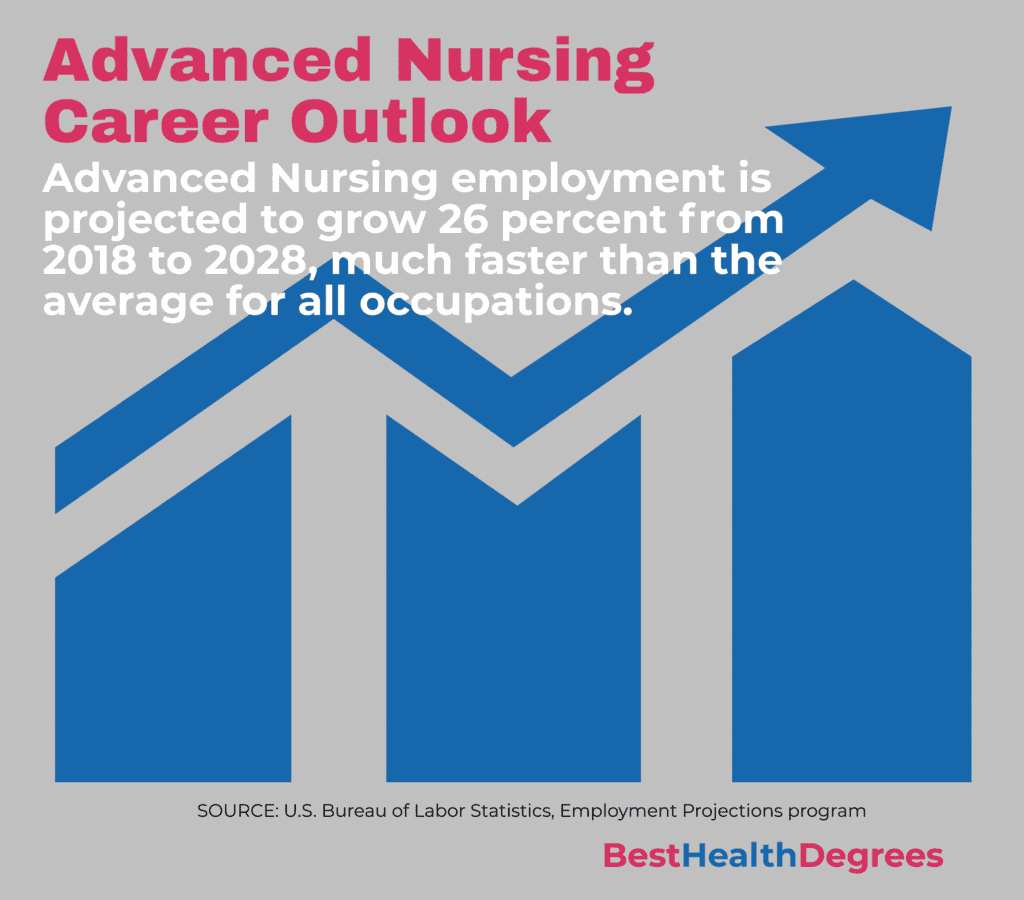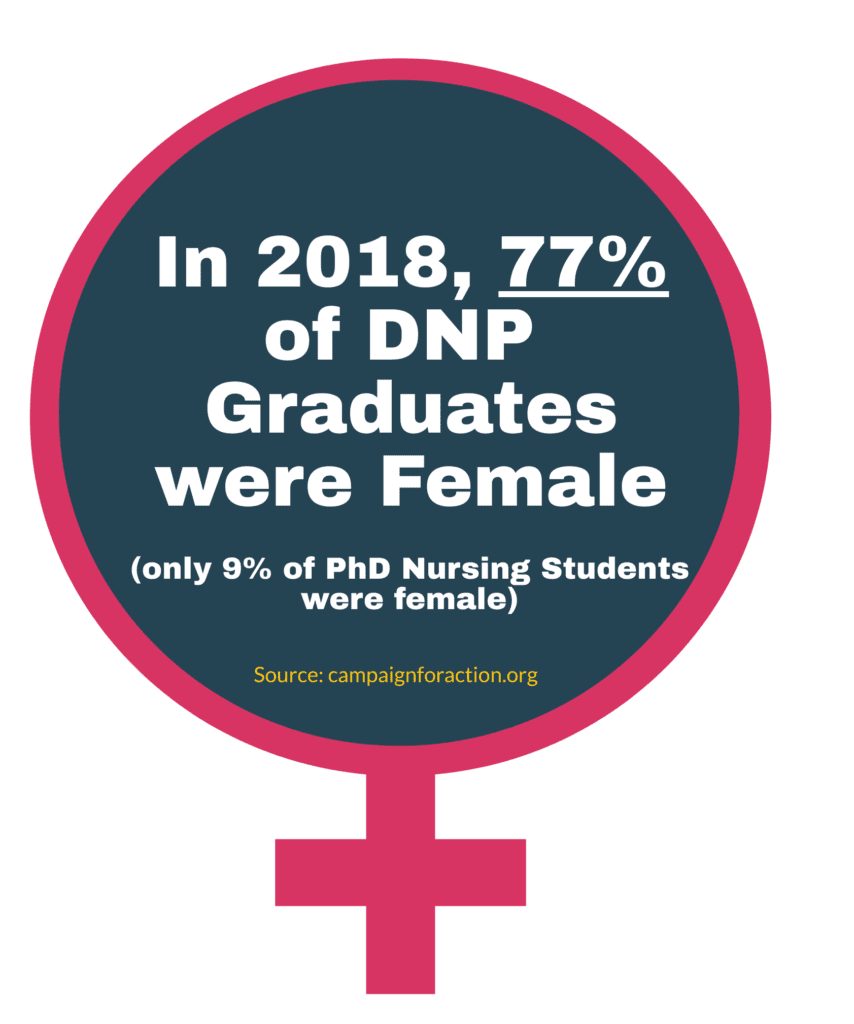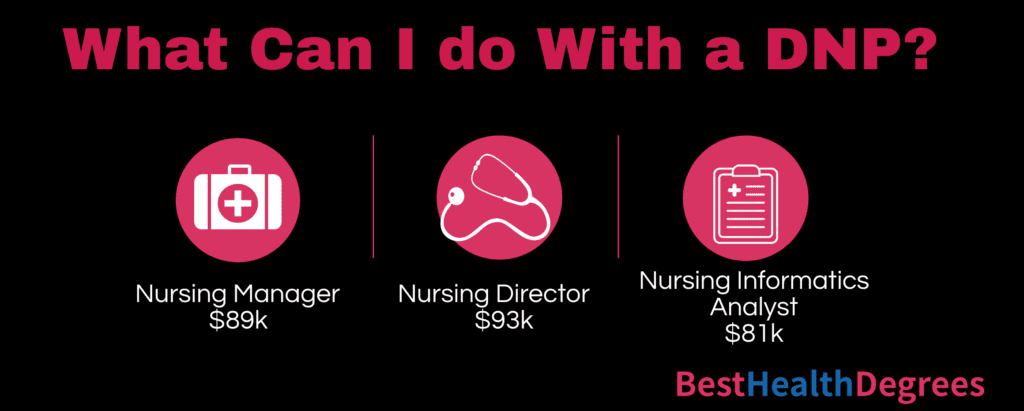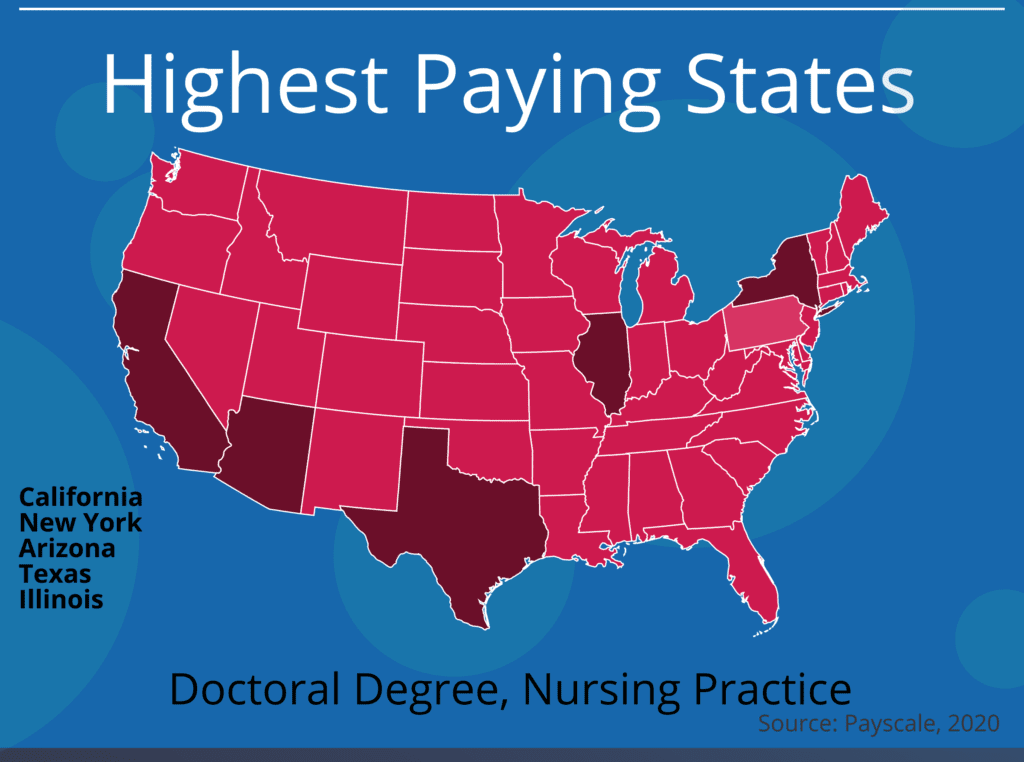Key Takeaways: DNPs qualify for advanced roles like Nurse Practitioner, Nurse Anesthetist, and Nurse-Midwife.DNP vs. PhD: DNP focuses on clinical practice; PhD targets research and academic teaching.A Doctor of Nursing Practice is the highest practice-focused nursing degree one can get.DNP specializations include fields like Cardiology, Orthopedics, and Oncology, with a focus on specific patient populations.Strong growth is projected with high earning potential, especially in specialized roles like Nurse Anesthetist.
- What is a DNP?
- Is a DNP a doctor?
- What is a Doctor of Nursing Practice (DNP)?
What is a DNP?
A Doctor of Nursing Practice (DNP) degree is a doctorate-level degree in nursing that is practice-, rather than research-based. A doctorate in Nursing degree is one of the nursing field’s two top degrees. A DNP degree is the zenith of nursing degrees that is practice-focused.

The Doctorate in Nursing degree is specifically designed for nursing professionals who wish to become leaders in the direct care of patients within clinical settings. Those who complete a DNP degree program typically need to study for the degree for three to five years. Let’s first clarify the DNP meaning.
The Doctor of Nursing degree offers academic programs in General Leadership or with an Administration focus. Many DNP candidates choose to specialize in one of the many Advanced Practice Registered Nurse (APRN) specialty degrees.
A DNP degree program is designed to prepare students to become the next generation of nursing leaders and nursing specialists. Now that answers the question – what is a Doctor Nursing Practice?
What does DNP stand for in the medical field?
The Doctor of Nursing Practice (DNP) is representative of the highest level of academic achievement in the field of nursing. Nursing professionals who have earned their DNP are in possession of the knowledge, training, and experience to effect change and improve patient outcomes and influence healthcare outcomes.
What is the DNP Program’s Curriculum?
The DNP meaning is doctor of nursing practice. To further understand what is a DNP, a person must understand that this is the most advanced degree a nurse can receive. A person begins his or her nursing career by completing an associate’s or a vocational nursing program. Once he or she has an RN or LPN, it’s possible to earn a bachelor’s of science in nursing. Total, these two undergraduate degrees take three to four years to complete. Then, a doctorate program takes three to five years to complete.
The Doctor of Nursing degree is an APRN – Advanced Practice Registered Nurse degree. APRN nursing professionals have the opportunity to further specialize in a wide variety of advanced nursing areas. A few examples include:
- Nurse Anesthetist
- Nurse-Midwife
- Nurse Practitioner
- Neonatal Nurse Practitioner
- Nurse Executive
- Nurse Informaticist
The Take-Away – Nurse practitioners (NP’s) are advanced healthcare providers with the authority to administer patient care, diagnose medical issues, and prescribe medication, among other responsibilities.
A Nurse Practitioner must hold a minimum of a graduate academic degree, while many choose to earn a DNP to optimize their career possibilities.
Choosing a DNP Program
Have you considered any of the following career-related questions –
- Why should I get a DNP?
- What is the difference between a nursing DNP vs PhD?
- Should I get my MSN or DNP?
- What is the difference between a DNP and PhD in nursing?
- Is a DNP a doctor?
- What is the difference between a DNP and a PhD in nursing degree program?
The following degree comparisons are a partial list of the leading degree comparisons to consider –
- DNP vs NP
- DNP vs MD
- DNP vs PhD, and
- The MSN vs DNP debate
When comparing DNP vs NP degree programs, it is important to remember that –
- The term Nurse Practitioner (NP) is a job description or job title
The phrase Doctor of Nursing Practice is the degree bestowed upon a graduate of the DNP program. Many DNP degree holders include the nursing specialty acronym in their nursing credentials – i.e., a DNP-FNP, would stand for a Doctor of Nursing Practice– Family Nurse Practitioner.
The Nursing DNP vs PhD Comparison
Have you considered the difference between a DNP and a PhD in nursing degree, or have you asked yourself Should I get my MSN or DNP?
Is a DNP a Doctor?
The coursework and professional applications of the medical knowledge and medical technology taught in these programs can often be quite different. Yet, a DNP and nursing PhD are both recognized as the pinnacle of nursing academic degrees.
In its most widespread interpretation, the difference between a DNP and PhD in nursing is that a DNP is a clinical practitioner with a graduate-level of nursing education that gives them the authority to diagnose illnesses and prescribe medicine, among other elevated nursing duties.
On the other hand, a nursing professional who holds a PhD has been educated to work in nursing research with cutting edge nursing methodologies. PhD nursing professionals work as nurse scientists, educators/scholars.
The DNP vs MD Comparison
A DNP (doctor of nursing practice) and an MD (medical doctor) are vastly different. One is trained in nursing, and the other is trained in medicine.
The DNP nurse has achieved the highest degree awarded in the field of nursing. It demonstrates that the nurse exemplifies clinical expertise and knowledge in the field and that the nurse is skilled in identifying healthcare-related issues and can propose evidenced-based solutions in the ever-changing world of healthcare.
An MD is an acronym for a medical doctor. While it may be evident that a DNP is a nurse and an MD is a doctor, the explanation of the differences goes a little deeper than the title.
The MSN vs DNP Comparison
A nurse practitioner is professionally prepared to practice holding either an MSN (Master of Nursing Science) degree or a Doctor of Nursing Practice (DNP) program. The DNP nursing professional will have received the next (and highest) degree level in the nursing industry. DNP degree candidates complete coursework in these fundamental competencies –
- Health Care Policy
- Evidence-Based Practice
- Interprofessional Collaboration
- Organization
- Systems Leadership
- Healthcare Informatics
- Technology
It is also noted that DNP degree candidates must complete 1,000 post BSN hours of a clinical practicum. Hours completed by earning an MSN degree are typically included in this requirement.
Nursing School/Program Accreditation
The act of regional accreditation is bestowed by the seven regional agencies established by the United States Department of Education (USDE). The US federal government, through its regional agencies, is responsible for managing and bestowing regional accreditation to those schools that meet the exalted accreditation standards set forth by the USDE.

In addition to regional accreditation, nursing schools and nursing programs at the graduate and undergraduate level choose to apply for voluntary specialized accreditation. Specialized accreditation often set stricter accreditation criteria. The following programs are likely to be accredited by a specialized oversight agency –
- DNP programs online accredited
- CCNE accredited online DNP programs
- Doctor Nursing Science programs online
- Accredited DNP programs online
- Traditional coursework for accredited DNP programs
Nursing School Accreditation
Nursing School Accreditation is a more specialized accreditation than that of regional accreditation. Specialized accreditation for the nursing industry is primarily administered by two industry oversight agencies –
- The CCNE – the Commission on Collegiate Nursing Education
- The ACEN – the Accreditation Commission for Education in Nursing
Nursing schools and nursing academic coursework that receive specialized accreditation have the ability to assure interested students that the course described in the school’s catalog or on the website, is the same course they will experience while earning their nursing degree.
And, the coursework for a specialized DNP nursing program with accreditation reveals to potential degree candidates that DNP programs online accredited (and traditional on-campus courses) have met industry-defined minimum skill and knowledge standards.
Whether you are looking at CCNE accredited online DNP programs, or ACEN accredited online DNP programs, it is critical to double-check that the nursing program you have chosen has received accreditation from either oversight agency.
The Commission on Collegiate Nursing Education (CCNE)
The United States Department of Education (USDE) is tasked with the responsibility of approving specialized accrediting agencies, by bestowing national accreditation status to those agencies that the USDE approves. In turn, the Commission on Collegiate Nursing Education (CCNE) administers the specialized accreditation in accordance with industry-defined minimum criteria.
The ACEN – Accreditation Commission for Education in Nursing
The Accreditation Commission for Education in Nursing – administers an accreditation protocol that offers specialized nursing accreditation to schools offering nursing degrees at bachelor, masters, and doctoral levels. Like CCNE accreditation, ACEN accredits those nursing programs and schools that have passed industry-approved minimum standards.
The only distinction between CCNE and ACEN is that the latter has been accrediting nursing schools and programs for a longer period of time.
The Academic Pathways to Earning a DNP Degree
Those interested in earning a Doctor of Nursing Practice degree have several pathways to consider. All of these academic paths to a DNP degree have the same objective, just a different starting point for the degree candidate.
When seriously considering earning a DNP it is important to ask the right questions, like –
- What are the available BSN to DNP Programs?
- What are the cheapest online DNP Programs that have received accreditation?
- With regards to the MSN to DNP how long does that program take to complete?
- What are the cheapest DNP Programs?
- Do DNP tuition rates differ between schools?
- What are the cheapest DNP Programs that have received specialized accreditation?
- What are the average costs of DNP program online and on-campus?
- What are the cheapest online DNP Programs?
BSN to DNP Programs
The academic pathway of BSN to DNP Programs is the perfect choice for nursing professionals who currently hold a Bachelor Science in Nursing (BSN) and wish to earn a Doctor of Nursing Practice (DNP) without needing to complete a Master of Science in Nursing (MSN) degree separately. Full-time students enrolled in BSN to DNP Programs typically complete the coursework in three or four years; however, part-time students will need four to six years to complete the DNP degree.
MSN to DNP Programs
DNP degree candidates who currently hold a Master of Science (MSN) can opt for an MSN to DNP degree program. This pathway to a Doctor of Nursing Practice is recognized as the most common path to obtaining a DNP degree. The MSN to DNP program is generally designed for Registered Nurse (who already hold an MSN degree). The MSN to DNP program is typically completed in two years for full-time students or about 2-3 years for part-time students.
RN to DNP Programs
Doctor of Nursing Practice degree candidates who are Registered Nurses (RNs) that hold an ADN – an Associate Degree in Nursing – bypassing a separate Bachelor Science in Nursing (BSN) or Master of Science (MSN) program. RN to DNP programs (like BSN to DNP programs) requires four years of full-time study, whereas part-time students will need up to six-year to complete the degree program.
The Doctor of Nursing Practice degree is considered as the pinnacle academic degree (for practice-based nursing degrees) with many in-demand specialties. Listed below are some of the more in-demand DNP specialist positions in the current marketplace –
- The Nurse Practitioner
- The Nurse-Midwife
- The Nurse Informaticist
- The Nurse Educator
- The Nurse Executive
- Clinical Nurse Specialists
- Health Services Managers
BSN to DNP Programs Online
There are many quality online BSN to DNP programs for students who wish to obtain their Doctor Nursing Degree without having to earn a Master of Science in Nursing (MSN). Each of the BSN to DNP programs should be researched before making a final degree program. Consider these online BSN to DNP programs as follows –
- Accelerated DNP programs online – i.e., 12 month online DNP programs
- A BSN to DNP programs online no GRE
- 12 month online DNP programs that have received ACEN or CCNE
- Accredited BSN to DNP programs online
When applying to BSN to DNP programs online NO GRE, (and other BSN to DNP programs), it is recommended that the DNP degree candidate has already successfully completed the following undergraduate coursework –
- Chemistry
- Pharmacology
- Pathophysiology
- Microbiology
- Physiology
- Anatomy
- Research Methods
- Health Assessments
- Community Nursing
Additionally, these BSN to DNP programs may require that the degree applicant hold a valid, unencumbered Registered Nurse (RN) license in the same state as the DNP nursing program is located – although this is not a given and should be researched carefully. I
Consider these additional requirements for accredited BSN to DNP programs online –
Clinical Practice Hours – While the exact number of clinical hours is not set-in-stone, the AACN recommends one-thousand clinical hours beyond the BSN achievement.
A Culminating Senior Capstone Project – DNP degree candidates must finish a healthcare focused, evidence-based capstone project.
DNP Specialties & Concentrations
The many Doctors of Nursing Practice (DNP) specialties make this advanced nursing degree quite versatile. Since the early 2000s, the AACN revised their advanced practice nursing degree requirements from a Master of Science of Nursing (MSN)
There are four categories of DNP specialties and APRN Roles.
Certified Registered Nurse Anesthetist (CRNA) – CRNA’s provide anesthesia in a variety of medical settings for trauma care, surgical, and obstetrics surgery.
Certified Nurse Midwife (CNM) – works alongside women from pre-pregnancy planning to post-partum issues.
Clinical Nurse Specialist (CNS) – evaluates and offers treatment to the populations within their nursing specialty.
Certified Nurse Practitioner (CNP) – works within chosen specialty nursing areas in a variety of settings providing comprehensive care.
APRN (advanced practice registered nurses) Specialty Care Options include –
- Adult Care Nurse Practitioner
- Adult-Gerontology Nurse Practitioner
- Emergency Nurse Practitioner
- Family Nurse Practitioner
- Neonatal Nurse Practitioner
- Psychiatric Nurse Practitioner
- Pediatrics Nurse Practitioner
- Women’s Health Nurse Practitioner
APRNs have the opportunity to refine their focus as they study for a DNP degree program. Examples of advanced practice nurses in areas such as oncology, palliative care, orthopedics, etc.
Note – In May 2018, NONPF – the National Organization of Nurse Practitioner Faculties issued a position notice that calls for the revised mandatory minimum education standard to be implemented by 2025. The statement called for; all NP entry-level positions have a minimum educational standard of a Doctor of Nursing Practice degree.
Doctor of Nursing – DNP Jobs & Careers
The field of nursing has always been a highly respected career. Nursing specialist salaries very often fall in the top earnings categories of all professions.

When interested DNP degree candidates have researched and reviewed the significant factors that impact a final DNP degree program decision, it is important to begin to fine-tune one’s focus on how to apply this DNP degree to a future career.
You have already learned the answer to – What does a DNP do?
However, now it is time to consider –
- What can you do with a DNP in Nursing?
- What is the DNP Job Outlook?
- What are the potential DNP Job openings at this time?
The DNP job description will differ due to the many ways in which a nursing professional who holds a Doctor of Nursing Practice degree may apply their advanced nursing degree. Essentially, the DNP job description will fall in line with the many specialty DNP nursing jobs.
APRN Specialist DNP Jobs for DNP Graduates
Check out the trending, in-demand DNP nursing jobs for DNP Graduates noted below. These jobs are within the nursing specialties of –
- Advanced Nursing Practice
- Cardiology
- Community health
- Emergency Care
- Endocrinology
- Forensics
- Hospice and palliative care
- Nephology
- Oncology
- Orthopedics
- Pain management
- Radiology
Nursing professionals holding a DNP degree who wish to practice in a clinical setting often choose to specialize in a defined patient population. A few examples of population-focused DNP positions would include –
- The Adult-Gerontology Population
- The Family/Individual – Across a Lifespan
- Neonatal
- Patient Outcomes
- The Pediatric Population
- The Psychiatric Population
- Women’s Health
When you have answered the question – What does a DNP do? – it is equally important to learn the settings in which DNP nursing professionals might work. Nursing professionals holding a Doctor of Nursing degree can potentially work in the following medical facilities or environments –
- Hospitals
- Physician’s Officers
- Surgical Centers
- Outpatient Medical Facilities
- Research Organizations
- The Federal Government
- Public Health Offices
- Independent Medical Office & Practices
DNP Salary Statistics
With so many nursing specialties from which to select, it is important to consider how DNP jobs salary and compensation packages differ among the advanced nursing degree specialties and options. The federal government manages the Bureau of Labor Statistics (BLS), a government agency that offers combined national statistics for Nurse Midwives, Nurse Practitioners, and Nurse Anesthetists.

The following statistics offer valuable insight into the national DNP salary data –
- Median Annual Pay for 2018: $113,930
- Median Hourly Wage for 2018: $54.70
- # of Working DNP Professionals (2018): 240,000+
The job growth outlook is quite impressive for these Doctor Of Nursing Practice/ Advanced Practice Registered Nurse specialties. Labor statisticians anticipate job growth through the year 2028 of 26%, a bit more than three times the national average for all occupations through 2028. This remarkable job growth expectation is anticipated to add more than 60,000 new Doctors in Nursing Practice (DNP) specialty job positions.
Nurse Anesthetists – BLS Occupational Data
According to the Bureau of Labor Statistics (BLS), Nurse Anesthetists, for 2018, have a national median DNP salary of $167,950. The states that offer the highest wages for Nurse Anesthetists are as follows –
- Montana – $246,370
- California – $212,210
- Iowa – $209,130
- Oregon – $205,730
- Wisconsin – $204,820
Nurse Midwives – Occupational Data
According to the Bureau of Labor Statistics (BLS), Nurse Midwives, for 2018, have a national median DNP salary of $103,770. The states that offer the highest wages for Nurse Midwives are as follows –
- California – $139,990
- Massachusetts- $119,380
- Maryland – $115,440
- Arizona – $114,900
- New Jersey – $113,980
Nurse Practitioners – Occupational Data
According to the Bureau of Labor Statistics (BLS), Nurse Practitioners, for 2018, have a national median DNP salary of $107,030. The states that offer the highest wages for Nurse Practitioners are as follows –
- California – $133,780
- Alaska – $122,880
- Massachusetts – $122,740
- New Jersey – $122,100
- New York – $120,970
Related Rankings:
25 Best Doctor of Nursing Practice Programs
10 Fastest Online DNP Programs
10 Most Affordable Online DNP Programs